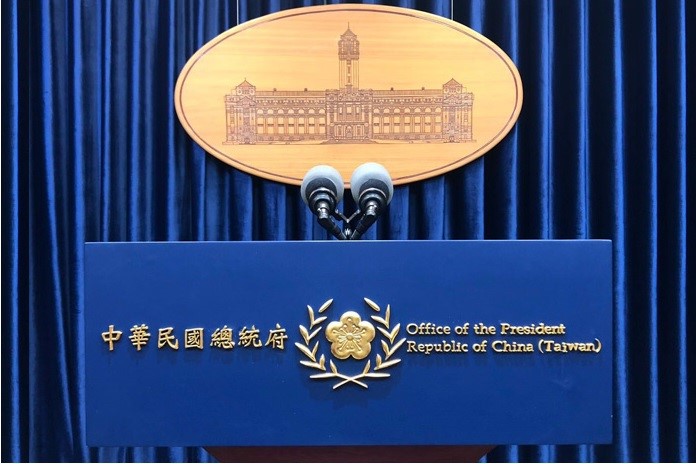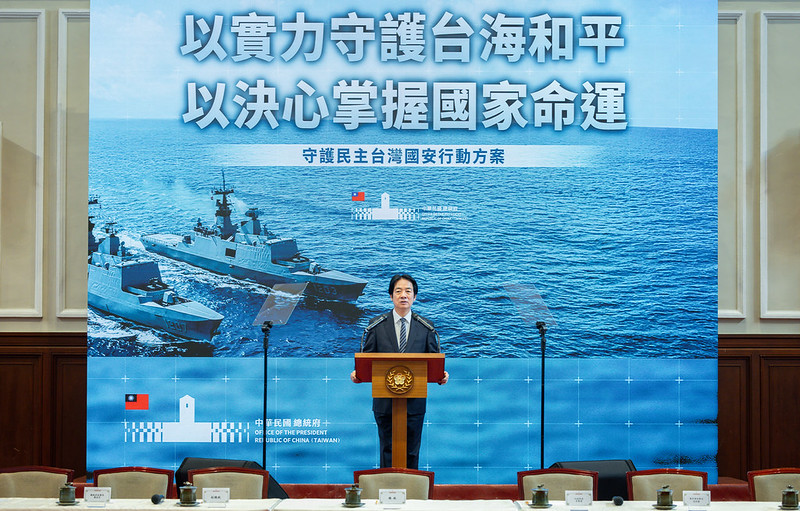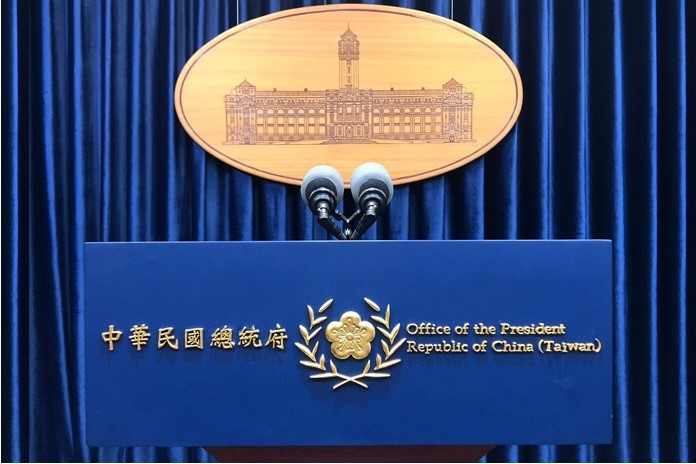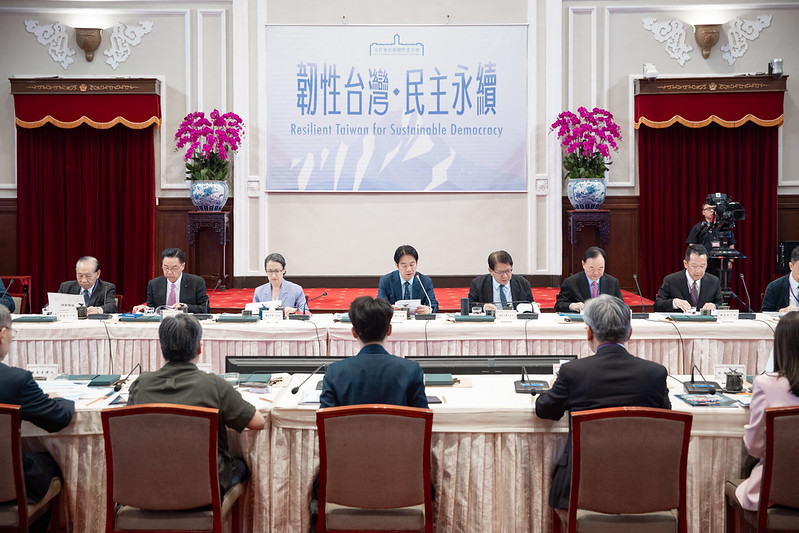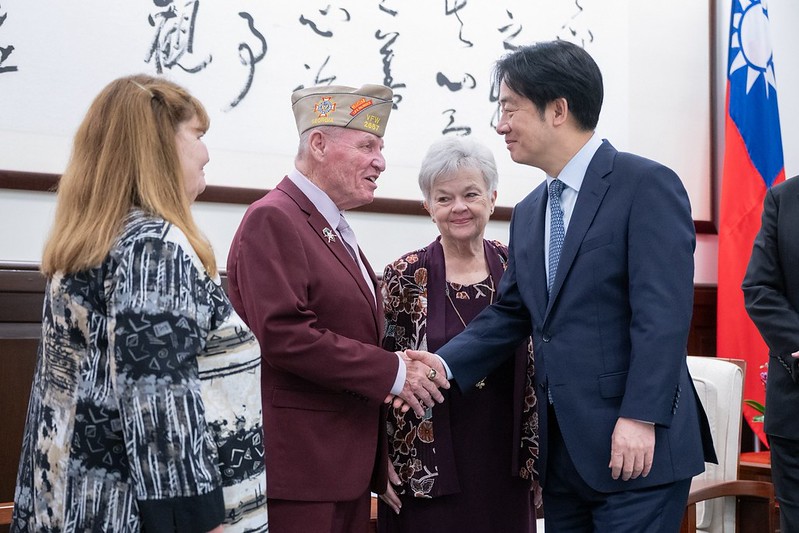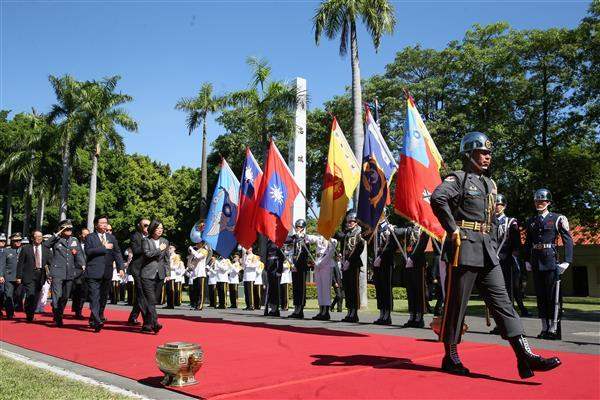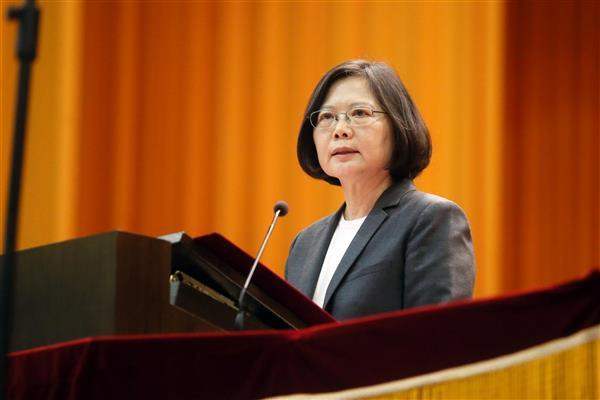News & activities
 News releases
News releases
On the morning of July 4, 2016, President Tsai Ing-wen went to the ROC Military Academy to attend a joint graduation ceremony of the ROC's seven military academies. In addition to praising the graduating students for successfully negotiating a variety of different challenges to graduate, the president also expressed hope that in their future military careers they will protect the country and fully discharge their responsibilities to themselves, others, and the country.
The following is a translation of the president's remarks:
Today we are holding the joint graduation ceremony for the ROC's seven military academies, so let me start by congratulating all the graduating students here. Today is your day. You should all be happy for yourselves, because to be able to graduate from one of our country's seven military academies is quite a feat.
A total of 965 people are graduating from the seven military academies this year. Over 20% of the students who first enrolled were unable to finish their studies for one reason or another, so your presence here today means that you've successfully dealt with a variety of different challenges. These have not all been academic challenges, either. In addition, there have also been moral challenges. And more importantly, each of you has shown the courage and willpower necessary to overcome every obstacle.
Graduation marks the end of your school days. From this day forward, your identity will be different from before. Once you formally receive your ranks, you will be key officers in our country's armed forces. You will no longer be students. I hope that each of you will act in a manner becoming of an adult by fully discharging your responsibilities to yourselves, your country, and your society.
I firmly believe that each of you is up to the task, because, unlike graduates of other schools, you are all uncommon young people.
At a time when others are pondering their future careers, you already know exactly the path you've chosen. This path is to defend the country. This path is your mission. The security of each family in Taiwan depends on you. Our national stability depends on you.
I also want to specially thank all the parents who are with us today. Thank you for always supporting your children. When they were undergoing grueling tests, your care and concern were their best source of strength.
From this day forward, each of you is formally dedicating your child to the country. Being apart more often than together is very possibly what the future holds in store for you. But please remember the expressions of honor and pride you see on their faces this day.
Your children are soldiers of the Republic of China. This is their choice. In the future, the country will assign them important duties, and they will bear an increasingly heavy load as time goes by, so please continue giving them your support. I firmly believe that they will do you proud.
Students in the ROC's seven military academies have a fine tradition–-entering the armed forces together and graduating together. In gathering here today, we are carrying on in this tradition. The tradition reminds people in each branch of the armed services that "the three branches are all one family, like brothers; the three branches are part of an inseparable whole, just as one's hands and feet belong to one and the same person."
For each of you, "the honor or discredit of one is shared by all."
Each branch of the armed forces has its own specialties, but beyond the division of labor, even more important is cooperation. You may wear differently colored uniforms, but your sweat and blood are expended toward the same task. That task is written out on the boards behind you all: "We fight for the development of the Republic of China. We fight for the safety and well-being of the people of Taiwan, Penghu, Kinmen, and Matsu."
In addition to having three branches that are part of an inseparable whole, it is also my earnest hope that all of you can take to heart that "the honor or discredit of one is shared by all." I hope you will feel that it's "all for one and one for all."
Many of you will be reporting soon to your units to assume your leadership duties on the front lines. Relationships among peers are much closer in the armed forces than in any other type of organization. Regardless of rank, and no matter what year you joined, you rub elbows from morning to night. You are all family.
You will learn together, act on orders together, and suffer together. And amid countless trials and tribulations, you will grow together.
So please treat the others in your units just like you treat your own family. Help out with each other's work, take an interest in each other's daily routines, and share in each other's joys, anger, sorrow, and happiness. Share in all that is good. Share in the responsibility when mistakes are made. This is how true military officers behave. This you must do if you are to live up to the epaulettes on your shoulders.
Third, when we say that "the honor or discredit of one is shared by all," it also means that you are called upon to see yourselves as being in the same boat alongside all the people of Taiwan. For the sake of survival, we must all have each other's back.
Our armed forces' most important task is to ensure the peace and security of the people of Taiwan. In times of tension and confrontation, our armed forces stand on the front lines. When disaster strikes, our armed forces rush to the scene. Whether you are acting in your primary capacity as soldiers, or are taking part in disaster response operations, it is always the case that when everyone is putting everything on the line for the safety of our people and the stability of our society, that is precisely your time as soldiers to acquit yourselves with honor.
It is the sacred duty of soldiers to rush to the defense of our country and our people, and I believe that when we do so, we win respect. That is my most cherished hope for each of you.
Our armed forces have experienced some incidents in the past few days that I'm sure have everyone pretty worried. The public criticism and suggestions you now face make me feel sad and disheartened, just like you.
But I would urge you to take heart, and to move all the more steadfastly forward in the face of setbacks. We must have the courage to face mistakes and boldly take on all challenges. Our soldiers do not fear hardship or difficulty. Now is the time for you to demonstrate this spirit.
I'm not going to tell you all that everything in our armed forces is just wonderful. If I were to stand here and talk to you like that, I would be an irresponsible commander-in-chief of the armed forces. I'm not going to dodge the issues or evade responsibility. Our armed forces need to be reformed in a big, bold way. The reform effort must address many different issues—strategic guidance for the military; the priority scheme for where to invest our national defense resources; what level of troop strength is needed; and what weapons and equipment our armed forces really need. Since coming to office I have begun to work on these critical issues. From national security strategy to military strategy, our new government's relevant agencies have already begun working at every level to draft strategic guidance documents.
In addition, our national defense development efforts have long been out of synch with our economic development. The two have been locked in zero-sum competition for the same resources. I've always been concerned about this issue, and I'm not afraid of tackling the various problems that have a bearing on our national defense self-sufficiency.
We also need to reform our national defense systems and culture. There have been papering over problems, wasting human resources, and operating inefficiently in so many different ways; these problems will all be key focal points of our reform effort. I want to see to it that officers and enlisted personnel who are serious about doing good work will no longer be filled with frustration. And I myself will be working hard to ensure that during your future careers in the armed forces you will see systemic changes taking place.
At the same time, I am also concerned about your personal development. In the past, there has been a stark separation between life in the military and life in society. This has led to much waste of talent and caused uncertainty among military personnel about what would become of them in their post-military lives.
I will do everything I can to overcome this situation so that our officers and enlisted personnel are not just first-rate soldiers, but are also professional managers and engineers. We are going to see to it that investments in the armed forces serve as an engine for industrial innovation. When national defense and industry are linked together, after leaving the service you will be able to use your specialized expertise to contribute to Taiwan's industrial development.
This is the overall direction of future national defense reform. In speaking like this at your graduation ceremony, I seek only one objective—I want to tell everyone that the military career that awaits you has a goal, a direction, and a certainty. It is an honorable career. These reforms are not just talk, and I certainly won't be standing clear of the fray. I've said it many times before, and I'll repeat here today that I include myself when I say that "the honor or discredit of one is shared by all." I stand together with you on that score.
When things go well in the armed forces, the credit goes to all of you. When things go wrong in the armed forces, I will take a critical look at myself and, standing right alongside all of you, I will think of ways for us to bounce back from our reverses. Only reform can win us respect. Only with discipline can we carry through with reform.
In the future, when our armed forces have regained respect, I more than anyone will feel happy for you.
I wish you all a happy graduation, and smooth careers in the armed forces. And finally, in my capacity as commander-in-chief of the armed forces, allow me to welcome each of you as you formally join the family of our armed services. Let's all go forward and do our best!
